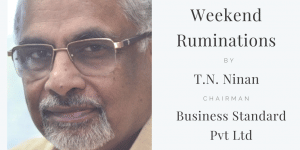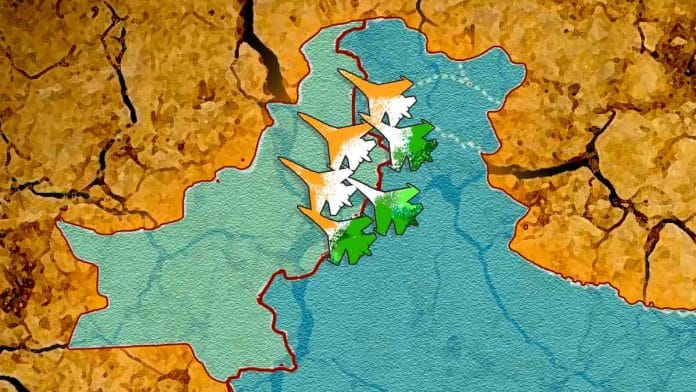Perhaps the biggest positive takeaway from the military action over the last few days is the evidence of India’s new diplomatic heft. People old enough to remember earlier conflict situations will recall how no non-aligned country spoke up for India during the wars of the 1960s — though India had been a co-founder and leader of the non-aligned movement. Even in 1971, it was principally the Soviet Union that stood by India, as it had done more than once by using its veto in the UN Security Council. In comparison, today India enjoys the support of not just the leading Western powers but also of middling powers like Australia, friendly engagement with Russia, and most remarkably, some helpful intervention by Arab countries. To have the external affairs minister speak as a guest of honour at the Organisation of Islamic Cooperation, even as the Pakistan foreign minister feels obliged to boycott it in protest, is something that few would have predicted.
 The change in the diplomatic situation began with Bill Clinton and Kargil in 1999, and has to be credited to the sustained diplomacy of successive governments and prime ministers, including the present one; India’s increasing importance as a market; and changed perceptions about Pakistan as “an international migraine”, to quote a former US secretary of state. Husain Haqqani, the former Pakistan ambassador to the US, had to point out the uncomfortable truth to Islamabad that not one country had spoken out in its favour after India sent in its Mirages.
The change in the diplomatic situation began with Bill Clinton and Kargil in 1999, and has to be credited to the sustained diplomacy of successive governments and prime ministers, including the present one; India’s increasing importance as a market; and changed perceptions about Pakistan as “an international migraine”, to quote a former US secretary of state. Husain Haqqani, the former Pakistan ambassador to the US, had to point out the uncomfortable truth to Islamabad that not one country had spoken out in its favour after India sent in its Mirages.
The biggest negative takeaway from this past week has to be the news-distorting nationalism of ratings-hungry TV news channels, with bellicose anchors screaming war from the safety of their studios while the wives of fallen soldiers pleaded for dialogue and peace — and got trolled for their pains. It is an old dictum that one should not fall prey to one’s own propaganda, and it must be hoped that those in charge of national security and international relations have cooler heads than those venting on talk shows. It would be as well to remember the pressure that news television mounted on the Vajpayee government to yield to the Kandahar hijackers, leading to the freeing of (among others) the leader of the Jaish-e-Mohammed. The country is paying for that today.
Also read: India must know it is all alone in its fight against Pakistan-sponsored terrorism
The truth about the military engagement over two days is that it was not a clear victory for India. The Modi government has taken a step forward by putting in place a more aggressive response to cross-border terrorism, and by striking targets in Pakistan, but the country has also lost a fighter plane. Though the prime minister has talked somewhat needlessly of pilot projects and the real stuff to come, India cannot be sure of a clean victory in any full-fledged conflict — even if there is reason to engage in such.
Indeed, the loss of the MiG-21 raises the inevitable question why the air force still has to fly such dated aircraft, putting both planes and pilots at risk. The failure to equip the armed forces with contemporary weapons in sufficient numbers, such as to offer a demonstrable deterrent, points to the hard fact that defence budgets (especially for weapons acquisition) have been squeezed for years together. The finance minister rightly asked why India should not do what the Americans did by taking out Osama bin Laden. The only reason why not, is the difference in capabilities. That is what needs to be addressed.
There is one other domestic issue to consider: Is the policy on Jammu & Kashmir working? The figures show escalating violence and killings, while field reports talk of growing alienation in the Kashmir valley. The unusual experiment with a coalition government comprising polar opposites did not last, and the state is under President’s Rule. Terrorism in the state would not continue if it had no domestic roots. Ignoring this reality is not going to achieve anything. Instead, matters could get worse — especially if there are more episodes of Kashmiri students and workers being driven out of other parts of the country. The Kashmir problem cannot be ended without winning over the Kashmiri.
Also read: Bilateralism has failed. India can make peace with Pakistan only with big-power guarantees
By Special Arrangement with Business Standard.







An excellent article. One unintended consequence of the entire episode is that the Rafale debate is dead. However, purchase of mere 36 Rafale planes is not enough. We need more numbers. The current government in its five years tenure should have done more to plan replacement of aging outdated fighter planes. Now about war anthrea of terrorism. Obviously, the threat of terrorism stays. As such, there is not much change in the ground reality, except that Pakistan will have to factor in India’s ability to strike with air power. As in the past, the new government will have to deal with the issue of terrorism with patience and cool mind. The foremost consideration is that this threat has be contained to ensure that it doesn’t impact our economic growth story. World respects power, which manifests in different ways – power of the bullet, money and knowledge. In all these three areas, India has to maintain its growth. If Pakistan continues to sponsor terrorism, it would be suicidal from them. India has to protect itself from the impact of Pakistan’s sad self-destruction.
No one wants wat, but war and peace are not mutually exclusive. At times, to bring about order, war needs to be waged. There are several examples of this in the history of the world. Akbar waged war and established a functional system in our huge geography; WWII restored order in Europe which, since has evolved immensely on issues such as race, religion, discrimination, environmental issues, human rights.
If Pulwama needs to be used as an opportunity to bring about order in South East Asia, so be it. The government of the day should relentlessly pursue a multi-pronged agressive strategy to its end without any fear of electoral losses or greed for similar gains. It should be clinical and firm, just like a competent surgeon on an operation table.
A forensic audit will also be required of the accuracy of the munitions used for the Balakot mission. The smart bombs are expected to have a Circular Error Probable of three metres.
As an Indian I am happy to read the phrase, “India’s new diplomatic heft”, but in the name of truth, I must say that this “heft” is only because Pakistan has dug itself into a hole; it is by default, and not because of Mr Modi’s umpteen foreign sojourns. Let no one use it as an excuse for the prime minister’s absence from the country for a total of more than eight months. World leaders have not so much stood WITH India as stood AGAINST Pakistan. This is a different scene from earlier times because Pakistan’s terrorism hadn’t then reached INTERNATIONAL shores. Its roughish-ness was confined only to its neighborhood. Pakistan ratcheted up its terrorism with the dawn of the present century: 9/11of 2002 mastermind Omar Sheikh was a Pakistani; terrorist attackers in London, France, Belgium, Germany, Russia and even China were found to have some Pakistan connection; Osama bin Laden was found in Pakistan; even the present Al-Qaida chief, Zawahiri is supposed to be hiding somewhere in Pakistan.
It was Pakistan’s “ambition” to be recognised as “formidable” that has got it recognised as the international bad boy, without anyone’s help.
Quite informative and researched narrative. Actually, both Nehru and Indira, particularly Nehru, wanted to be called howks and doves at the same time. They wanted to be looked strong leaders for domestic audience and Messiah of peace internationally. Moreover, both wanted to be seen as anti west for the millions of Indians, because of the then anti England atmosphere, but in their personal habits and feelings they were more English than the Englishmen. They found ready audience among the leaders of the newly liberated nations of Asia and Africa. These too had similar, both pro and anti west feelings. Most of these leaders supported USSR publically, but were dependent on went for economic reasons. The so-called group of Nonaligned nations was such a group of leaders, not countries, who have the habbit of saving their own interests. Nehru tried to be friendly with Muslim countries at the cost of friendship with Israel, but these never supported us on Kashmir. None came in favour of us during China war. Even Russian kept equal distance at that time. Only the deteriorating relations between Russia and China compelled formers to align with us. Both Nehru and Indira cared more for their personal image internationally. But Modi has no such image related compulsions. He damn care what others think about him. And that is the real qualities of a real leader.